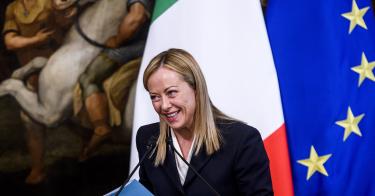Only a few years ago, Europeans treated the rise of populism like a spate of bad weather. They were sure it would quickly pass. In the United States, the left assumed populism would end with former President Donald Trump’s defeat in 2020. Both were wrong.
Today, the ranks of conservative governments are growing in Europe. And while the recent U.S. national elections did not see the “red wave” many had anticipated, the “red trickle” demonstrated that conservatism remains alive and well. Indeed, Republicans turned out more voters nationwide than the Democrats did.
Today, conservatives on both sides of the Atlantic are emboldened, pressing for reforms to keep their people safe, free and prosperous. In the next two years, you can also expect them to try to tip the trans-Atlantic polity in a new direction.
Take the example of Italy’s new conservative government, which is emerging as a kind of political laboratory for a new European bloc capable of strengthening trans-Atlantic relations. The new premier, Giorgia Meloni, is chairperson of the European Conservatives and Reformists Party (ECR), representing 16 countries. The Italian government could be a bridge between the ECR and the EPP (European People’s Party), which represents 81 parties from 43 countries. Indeed, these two political forces include, respectively, Fratelli d’Italia and Forza Italia (two of the parties that belong to the current parliamentary majority in Italy).
>>> Meloni and Italy’s Conservatives Will Strengthen Transatlantic Relations
This bloc would strengthen opposition to irresponsible European Union migration/asylum policies and the excesses of the EU’s powers and bureaucracy while reinforcing commitments to family, religious liberty and other traditional European values.
Such a European partnership could marginalize the Party of European Socialists, which includes some political forces that have supported pro-Russia and pro-China positions. For example, the German Social Democratic Party is co-responsible for Angela Merkel’s deplorable policies that made Germany and the EU dangerously dependent on Russia for energy. Other leftist policies aren’t looking much better. German Social Democratic Chancellor Olaf Scholz recently strengthened Berlin’s ties with Beijing, while the Italian Democratic Party supported the nefarious nuclear deal with Iran and brought Rome closer to the People’s Republic in recent years.
An EPP-ECR bloc could also strengthen trans-Atlantic relations, in part because the European center-right and American conservatives align on a number of issues, including skepticism over climate policy; education, family and gender issues; immigration and border security; peace through strength and support for NATO.
In the foreign policy space, for instance, Ms. Meloni’s actions promote a common cause across the trans-Atlantic space. One of her first initiatives was to strengthen ties with Poland. Warsaw is on the front line against Russia within the Atlantic Alliance and is a staunch American ally. Moreover, Ms. Meloni clearly aims to abandon Italian subjection to the Franco-German axis and, instead, place Rome at the center of a new international network along with the United States, Poland and (perhaps) Britain.
>>> Hungary Leads Way in Defense of Conservative Values, Culture
Such a strategy is probably the cause of the recent French irritation with Italy. Formally, the diplomatic crisis between Rome and Paris broke out due to disagreements over illegal immigration. It is likely, however, that Emmanuel Macron is trying to hinder Italy politically because he fears that Ms. Meloni could strengthen trans-Atlantic relations. Since relations between France and the United States have been significantly tense under both Mr. Trump and President Biden, Mr. Macron is troubled by Ms. Meloni’s pro-U.S. line and lack of deference to Paris.
All of this could be good news for trans-Atlantic relations, particularly if voters across the Atlantic continue to break right. Time will tell.
U.S. presidential elections and the next European parliamentary elections will be held in 2024. The next two years could therefore be crucial in building a new trans-Atlantic conservative partnership. While many on the left predicted that the rise of populism would threaten the trans-Atlantic community, conservatives could be the glue that will bind the trans-Atlantic space together.
This piece originally appeared in The Washington Times




